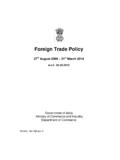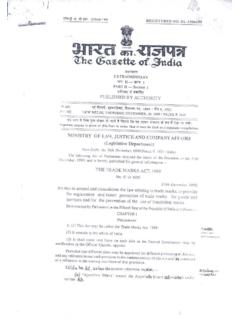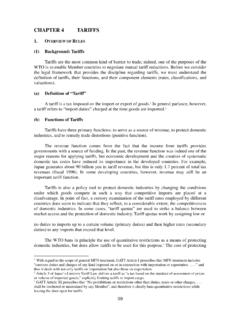Transcription of EXPORT INSPECTION COUNCIL OF INDIA CONTENTS
1 2/07-2006 (1) EXPORT INSPECTION COUNCIL OF INDIA CONTENTS Sl. No. Particulars Page No. 1. Introduction 3 - 4 2. Generalised System of Preferences (GSP) 5 - 7 3. Global System of Trade Preferences among developing countries (GSTP) 8 - 11 4. Asia Pacific Trade Agreement (APTA) 12 - 14 5. SAARC Preferential Trading Arrangement (SAPTA) 15 - 17 6. Indo-Sri Lanka Free Trade Agreement (ISFTA) 18 - 21 7. INDIA Afghanistan Preferential Trade Agreement (IAPTA) 22 - 25 8.
2 South Asian Free Trade Area (SAFTA) 26 - 29 9. CECA between INDIA & Singapore 30 - 33 10. Early Harvest Scheme Under Indo-Thailand Framework Agreement (ESH-ITFA) 34 - 37 11. INDIA MERCOSUR Preferential Trade Agreement(IMPTA) 38 - 38 12. INDIA Korea CEPA 39 - 39 13. ASEAN INDIA Free Trade Agreement 40 - 40 14. INDIA -Malaysia Comprehensive Economic Cooperation Agreement (IMCECA) 41 - 41 15. INDIA -Japan Comprehensive Economic Partnership Agreement (IJCEPA) 42 - 42 16. On Pre Exportation Verification 43 - 44 17. Guidelines for Issue of Certificate of Origin under Tatkal Scheme 45 - 45 18.
3 Procedure for obtaining Certificates of Origin from EIAs 46 - 48 19. EIC Network 50 53 20. Amendment to Document /2007/Issue 01 53 - 56 2/07-2006 (2) DISCLAIMER This booklet is meant for free distribution and has no legal value. While every care has been taken to ensure that the information contained in this booklet is correct, no liability or claim may be made against EIC. For full and detailed information, official text of relevant documents / Regulations / Agreements may be referred to. 2/07-2006 (3) INTRODUCTION EXPORT INSPECTION COUNCIL of INDIA (EIC) was established under the EXPORT (Quality Control and INSPECTION ) Act 1963, to advise the Central Government on measures to be taken for development of EXPORT trade through quality control and pre-shipment INSPECTION .
4 EIC operates through five field organisations known as the EXPORT INSPECTION Agencies (EIAs) with headquarters at Mumbai, Kolkata, Kochi, Delhi and Chennai. Over more than 38 years of its existence, EIC / EIAs have been instrumental in building quality awareness amongst a wide cross section of exporting industry. EIC / EIAs render services to the EXPORT sector in the following areas: * Certification of Product Quality in accordance with the norms and legislations of different destinations worldwide through Consignment-wise INSPECTION (CWI) or system approach including In-process Quality Control (IPQC) or Self Certification (SC).
5 * Approval and certification of processing and manufacturing units based on Food Safety Management Systems like HACCP, Good Hygiene/Manufacturing Practices (GHPs / GMPs). * Product Testing microbiological, chemical, biochemical, physical contamination, heavy metals, pesticide residues, biotoxins, additives and all other relevant parameters. * Training and technical assistance to industry in installation of food safety/quality/environment/laboratory management system meeting HACCP/ISO 9000/ISO 14000/ISO 17025 standards and norms; product testing and certification under preferential tariff schemes.
6 * Issue of Certificates of - Origin under preferential tariff schemes like Generalised System of Preferences (GSP), Global System of Trade Preferences (GSTP), SAARC Preferential Trading Agreement (SAPTA), Indo-Sri Lanka Free Trade Agreement (ISFTA), Asia Pacific Trade Agreement (APTA), South Asia Free Trade Area (SAFTA), CECA INDIA -Singapore, EHS Indo-Thailand and Indo-Afghanistan Preferential Trade Agreement (IAPTA) - Health for food items. - INSPECTION for all commodities. - Authenticity for Basmati Rice. Under the provisions of WTO Agreements, especially the SPS Agreement, several of INDIA 's trading partners have imposed import control systems based on international standards, particularly in food sector.
7 The WTO Agreements also provide for recognition of the EXPORT certification system of member trading partners provided it meets the requirements of their import control. EIC, as the official EXPORT certification body of INDIA , has initiated dialogue with several of INDIA 's trading partners seeking recognition of its certification. 2/07-2006 (4) Presently, EIC's certification is recognised in the following areas: 1. Basmati Rice by European Commission (for Certificates of Authenticity). 2. Black Pepper by United States Food & Drug Administration (USFDA) (as per which, any consignment of black pepper from INDIA , not accompanied by EIA's certificate, is detained on arrival in USA).
8 3. Fish & Fishery Products by European Commission (as per which, the processing units are specifically approved for EXPORT to European Union and the names of approved units sent to the European Commission for formal notification, after which they can EXPORT to EU countries). 4. Fish and Fishery Products by Australian Quarantine & INSPECTION Service (AQIS) Australia's official import control agency (as per which seafood consignments from INDIA accompanied by EIC's certificates will undergo only random verification sampling not exceeding 5% of the consignments and health certificates issued by EIC will be accepted).
9 Right from the inception of GSP in 1971, EIC has been functioning as the Nodal Authority for issue of GSP certificates of origin. In fact, it is the sole agency for printing and distribution of blank certificate of origin forms and one of the two organisations authorised by the Government of INDIA to issue GSP certificates of origin for all products. It also organises training programs on GSP and other Preferential Schemes for the benefit of certifying officials as well as the exporters and offers consultancy to exporters for qualification of products under all schemes of preferential origin.
10 Information in respect of services offered by the EXPORT INSPECTION COUNCIL of INDIA and its field organisations, the EXPORT INSPECTION Agencies is also available on the website In case of any query, kindly contact, EXPORT INSPECTION COUNCIL OF INDIA , (Ministry of Commerce & Industry) 3rd Floor, NDYMCA Cultural Centre Building, 1, Jai Singh Road, New Delhi-110 001. Tel: 011-2374 8189 / 2347 8188 / 2336 5540; Fax: 011-2374 8024 Email: Website: 2/07-2006 (5) GENERALISED SYSTEM OF PREFERENCES (GSP) Introduction The Generalised System of Preferences (GSP) is a non-contractual instrument by which industrially developed countries extend tariff concession to goods originating in developing countries.









